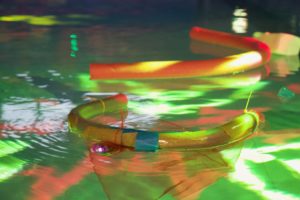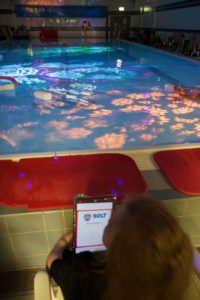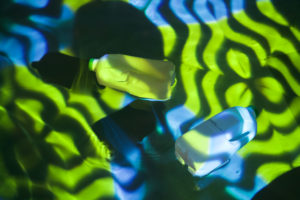Kate Farrell isn’t afraid to get her feet wet when it comes to engaging students with technology. Sometimes, she even brings her swimsuit!
Guest educator at Braidburn School for six weeks, Kate worked with a group of primary students to explore how technology can help reduce the amount of plastics polluting the ocean. The P7 pupils sorted different types of plastics, designed floating nets powered by Sphero robots, and then launched their designs at Braidburn’s pool. At Braidburn, which serves students who have additional support needs, the pool is regularly used for water therapy and exercise. It’s usually not filled with floating plastic bottles and yogurt pots that Kate sanitized at home prior to the event. But with the encouragement of Kate and the rest of Braidburn’s staff, pupils were quick to dive into the learning, throwing plastics into the deep end and guiding robots using an app on their ipads.


Sphero driven pool noodles (left). Controlling Spheros by iPad (right)
Spheros may look like toys, but they can launch a student’s imagination about the power of digital tools to help solve global issues. Kate’s colleague at the Digital Centre for Research in Digital Education, Tommy Lawson, has observed that some students need to see how technology connects to real life to become engaged in the nuts and bolts of computational thinking, digital literacy and programming.
Kate’s project at Braidburn is part of a larger curriculum design goal connected to her job as Director of Curriculum Development and Professional Learning. The Data Education in Schools project is developing curricular materials and professional learning for Primary and Secondary teachers who would like to include information handling and data literacy within their subject.
Immediately after gathering plastic out of the pool, Kate met with deputy headmaster Leslie Liddle to gain her feedback on the project. As Kate adjusts the unit plan, she plans to share the resources with schools throughout Midlothian and beyond. The reaction of the students at Braidburn highlights the power of interactive technology and real world problems to engage students. As Leslie noted about one student, “This is the first time she’s engaged with anything. It’s amazing.”
by Shana Ferguson, US-UK Fulbright Commission visiting scholar




